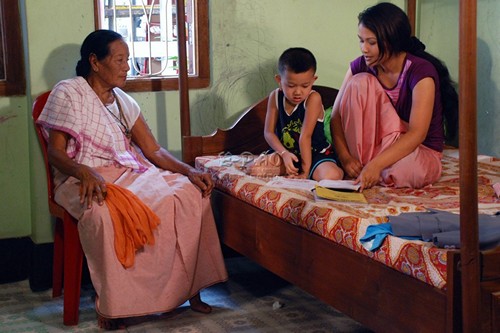"Why man wants mother, wife, girlfriend but not a daughter?" Breaking silence The 'Women's question' in our times.
Kimrose Haokip *

A manembok-mamau drama scene from the film 'Dharmagi mingda Imagidamak'
When I look back the dignity of women in our society, there I found, big strides but a long way to go for tribal's women. Women, breaking silences either by writing or speaking and occupying public spaces has been always considered an anomaly. A woman's being and body however has been the battleground for describing and legitimizing social customs and cultural traditions.
In the context of India, the imagery of the nation, the project of modernity and the 19th century reformist agenda – all had to be enacted on the basis of patriarchal notions of women's desire and her need for freedom without taking into account women's consent.
Did the women want to jump into the pyre of her husband and be a 'virtuous' sati?
Did every woman necessarily want to re-marry?
Was marriage the only secure institution left for the women? Did institution of marriage guarantee a life of dignity and freedom to women?
Did women to be blamed and get divorce for not having a male child?
These are questions which nobody ever asked any women, nor do most women ask themselves these questions even today. As outsiders they could claim the role of protector of our women, interceding on their behalf against brutal patriarchal practices which they justified as "white men saving brown women from brown men."
In a modern configuration of the division between public and private spheres, gender divisions effectively "naturalize" exclusions from public life. Gender division represents a complementary relationship that effectively produces, maintains, and reproduces individuals capable of acting in the public sphere through the labour of their counterparts who acts in private, and thus lack access to the rights and opportunities of public individuals.
If we ponder on the recent discourses on the issue of women's rights and examine the social and political responses to the Delhi and local rape case, we find that social and cultural anxiety over issues of conformity and chastity with regard to women over ride the sense of anger and condemnation for the heinous act.
Did the social and political unconscious of the nation address the issue of why the public streets are forbidden areas for women at nine o' clock in the night?
Why is that neither the state nor our social institution of patriarchy are capable of protecting or honouring our right to bodily integrity and yet can legitimize their agenda on the body politics of the women? Gendered analyses has shown that the maintenance of patriarchal ideology requires production of certain spaces as male domains and female domains.
It is the politics of spatial usage that determines its power. The (under) representation of women's body and experiences in social, political and institutional spatial structures constitutes the basis for gendered exploitation and violence. Therefore, hyper-masculinity and warring masculinities create insecurities for women and dominance among competing hyper-masculine groups need violence to be inscribed on women's body.
Experts say a woman's struggle begins right from the moment when she is inside the womb, and the battle continues. From her health, education and then a job – a woman never has a say.
The first battle starts from the womb. Sex selective abortions are common and can be seen even in affluent families. This is the main reason why brutalization and rape of a woman in times of war or conflict becomes also a symbolic act by the males in warring/conflicting groups to insult the honour of the man/clan/religion that a woman belongs to.
There are many other silences that need to be broken. But, have women found the appropriate language of resistance?
Can women realize the de-masculinisation of their own minds and speak the unspeakable, especially the subtle forms of violence prevalent in the lives of educated, elite and urban sections of women?
I conclude with a recent incident where one of the largest student's organization of the region in a seminar last week, as to why there was not a single women occupying any portfolio in the organization even after the fact that many women sacrificed their life for the organization.
The leader simply shouted her down and said – "madam, your allegation is not based on facts" without having the mind or honesty to find out why she observed so, herself being a distinguished academic and citizen of the region.
I feel like quoting kamala Das Surayya, "I am a million million silence/ strung onto someone else's song….." "Silence is also a language of a woman."
* Kimrose Haokip write this articlee for to The Sangai Express
The writer teaches English at Young Pillar's College, Tuibuong, Churachandpur, Manipur.
This article was posted on January 22, 2015.
* Comments posted by users in this discussion thread and other parts of this site are opinions of the individuals posting them (whose user ID is displayed alongside) and not the views of e-pao.net. We strongly recommend that users exercise responsibility, sensitivity and caution over language while writing your opinions which will be seen and read by other users. Please read a complete Guideline on using comments on this website.







